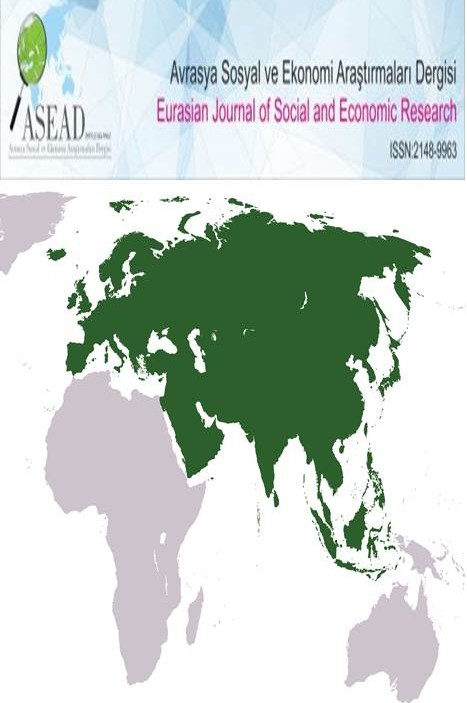TÜRKMENLİĞİN DİASPORİK TEMSİLLERİ: İSTANBUL’DA YAŞAYAN KERKÜKLÜ TÜRKMENLERDE GÖÇ, KİMLİK VE ENTEGRASYON
Diaspora, etno-kültürel kimlik, sosyal sermaye, entegrasyon
DIASPORIC REPRESENTATIONS OF TURKMEN: MIGRATION, IDENTITY AND INTEGRATION IN KERKUK TURKMEN LIVING IN ISTANBUL
Diaspora, ethno-cultural identity, social capital, integration.,
___
- KAYNAKÇA Bacacı H. (2013). Ürdün Kimliğinin Oluşmasında Filistinliler’in Etkisi, İstanbul: İstanbul Üniversitesi, Yayınlanmamış Master tezi. Barth, F. (2001). Etnik Gruplar ve Sınırları, İstanbul: Bağlam Yayınları. Ben-Rafael, E. ve Sharot S. (1991). Ethnicity, Religion and Class in Israeli Society, Cambridge: Cambridge University Press. Calhoun, C. (2007). Milliyetçilik, İstanbul: İstanbul Bilgi Üniversitesi Yayınları. Ciğerci, N. (2012). “Bursa-Kırcaali Hattı: 1989’da Gelen Bulgaristan Göçmenleri Örneği, Küreselleşme Çağında Göç, İstanbul: İletişim Yayınları. Clifford, J. (2015). “Diasporalar”, Diaspora ve Kimlik, Çev: Mehmet Ali Yolcu, Konya: Kömen Yayınları. Ersoy, İ. (2008). Diaspora ve Kimlik: Eskişehir ve İstanbul’da Yaşayan Kırım Tatarları’nda Çoklu Kültürel Kimliğin İfade Alanı Olarak “Tepreş”, İzmir: Yayınlanmış Doktora Tezi. Esman, M. J. (2009). Diasporas in The Contemporary World, Cambridge, Polity Press. Danış, Didem (2010). “Irak’tan Irağa: 2003 Sonrası Irak’tan Komşu Ülkelere ve Türkiye’ye Yönelik Göçler” Ortadoğu Stratejik Araştırmalar Merkezi. Rapor No:21. Duman, B. (2010). “Türkiye’ye Yönelik Türkmen Göçü ve Türkiye’deki Türkmen Varlığı” Ortadoğu Stratejik Araştırmalar Merkezi, Rapor No:19. Field, J. (2008). Sosyal Sermaye, İstanbul: İstanbul Bilgi Ünv. Yayınları. Füzer, K. ve Monostori J. (2016). “Social Capital, Social Exclusion and Rehabilitation Policy in the Hungarian Urban Context”, Urban Social Capital, USA: Routledge. Gellner, E. (1992). Uluslar ve Ulusçuluk, İstanbul: İnsan Yayınları. Galabuzi, G.E. and Teelucksingh C. (2010). “Social Cohesion, Social Exclusion, Social Capital”, Region of Peel Human Service, Canada. Hashim, A. S. (2006). Insurgency and Counter-Insurge in Iraq, New York: Cornell University Press. Jenkins, R. (2008). Social Identity, New York: Routledge. Liah G. (1992). Nationalism, USA: Harvard University Press. Öğün, S. S. (2000). “Türk Milliyetçiliğinde Hakim Millet Kodunun Dönüşümü”, Türkiye’de Politik Değişim ve Modernleşme, İstanbul: Alfa Yayınları. Öner, S.G.I. (2012). Ulus-Ötesi Göç Süreçlerinde Dini Ağlar ve Örgütler”, Küreselleşme Çağında Göç, İstanbul: İletişim Yayınları. Özet, İ. (2018). “Kentli Muhafazakârlarda Habitus Dönüşümü: Fatih ve Başakşehir Örneği”, Isparta: Yayımlanmamış Doktora Tezi. Özkul, D. (2012). “Ulus-Ötesi Göç: Uluslar arası Göç Yazınında Yeni Paradigma”, Küreselleşme Çağında Göç, İstanbul: İletişim Yayınları. Parkin, F. (2006). “Marxism and Class Theory: A Bourgeois Critique”, Social Class and Stratification, USA: Rowman&Littlefield Publishers, 121- 142. Parkin, F. (2002). Max Weber, London: Routledge. Pickel G. ve Gladkich A. (2012) “Religious Social Capital in Europe”, Transformations of Religiosity, Ed: Gert Pickel and Kornelia Sammet, Wiesbaden: Springer VS. Ramadan, F. (2016). Filistinli Mülteci Sorununun Ürdün Filistin İlişkileri Üzerine Etkileri, Ankara: Polis Akademisi Güvenlik Bilimleri Enstitüsü. Rex, J. (1991). Ethnic Identity and Ethnic Mobilisation In Britain, Economic and Social Council. Schulz, H. L. (2003). The Palestinian Diaspora, London: Routledge. Sennett, R. (2011). Ten ve Taş, İstanbul: Metis Yayınları. Silver, H. (1994). “Social exclusion and social solidarity:Three paradigms”, International Institute for Labour Studies, Switzerland. Smith, A.D. (2004). Milli Kimlik, İstanbul: İletişim Yayınları. Spencer P. ve Wollman H. (2003). Nationalism: A Critical Introduction, London: Sage Publication. Somersan, S. (2004). Sosyal Bilimlerde Etnisite ve Irk, İstanbul: İstanbul Bilgi Üniversitesi Yayınları. Stäheli, U. ve Stichweh R. (2002). “Introduction: Inclusion/Exclusion – Systems Theoretical and Poststructuralist Perspectives” Inclusion/Exclusion and Socio- Cultural Identities içinde, Stuttgart: Lucius Yay. Ulusoy, E. (2015). “Diasporayı Yeniden Düşünmek: Diaspora Teorisi ve Modern Diasporanın Temel Parametreleri”, Göç Dergisi, Cilt:2, Sayı: 2. Unger, R. M. (2004), Social Theory, London and New York: Verso.
- http://www.hurriyet.com.tr/ekonomi/2013-issizlik-rakamlari-aciklandi-25950400 (Erişim tarihi: 15.12.2018)
- TDK Sözlüğü, http://www.tdk.gov.tr/index.php?option=com_gts&arama=gts&guid=TDK.GTS.5c02d832643450.96021139 (Erişim tarihi: 01.12.2018)
- Yayın Aralığı: Yılda 4 Sayı
- Başlangıç: 2014
- Yayıncı: İrfan TÜRKOĞLU
MEHMET AKİF ERSOY’DA ŞEHADET ANLAYIŞI
OKUL ÖNCESİ EĞİTİM ÖĞRETMENLERİNİN ERKEN OKUMA YAZMAYLA İLGİLİ İNANÇLARININ İNCELENMESİ
Elif YALÇINTAŞ SEZGİN, Leyla ULUS, Ayşe B. AKSOY
KÜRESELLEŞME VE AVRUPALILAŞMA PERSPEKTİFİNDE TÜRKİYE’DE BÖLGESEL KALKINMA AJANSLARI
Osman Erdal ŞAHİN, Aytuğ ALTIN
OKULÖNCESİ DÖNEMDE YAŞAM BECERİLERİ
ŞİDDETİN GÖRÜNÜR HALİ; “BEYAZ BANT” FİLMİ ÜZERİNDEN BİR İZLEYİCİ ÇALIŞMASI
18. YÜZYILIN ÜNLÜ HEKİMİ ABBÂS VESÎM VE TIP KİTABI
Shaymaa İMAD, Sevim YILMAZ ÖNDER
KUR’ÂN KISSALARINDA BİR ANLATIM ÜSLÛBU OLARAK HZ. PEYGAMBER’İ KISSAYA DÂHİL ETME
KIRŞEHİR EVLİYALARINDAN MAHZENLİ ALİ EFENDİ VE KERAMETLERİNE DAİR BİR DEĞERLENDİRME (1841-1951)
POSTMODERN ADVERTISING: NEW ADVERTISING APPROACHES in the POSTMODERN ERA
AFGANİSTAN’DA YENİ AÇILAN TÜRKOLOJİ BÖLÜMLERİNİN TÜRK VE AFGAN KÜLTÜRÜNE ETKİSİ
